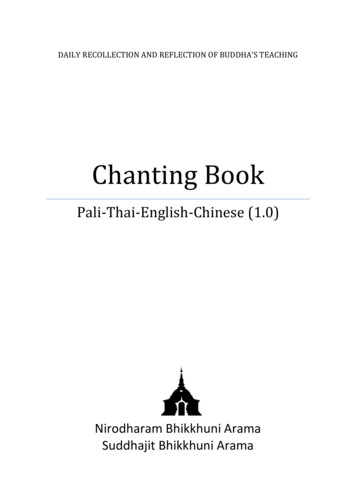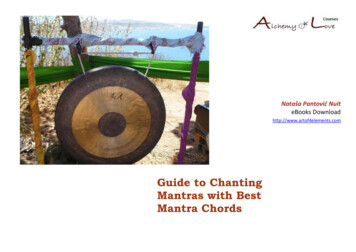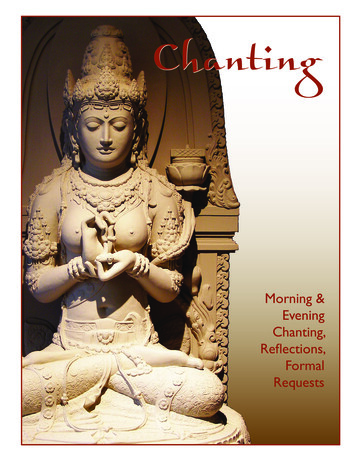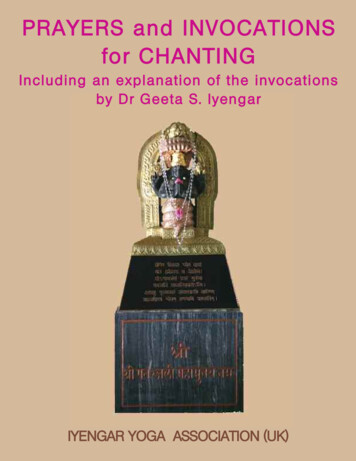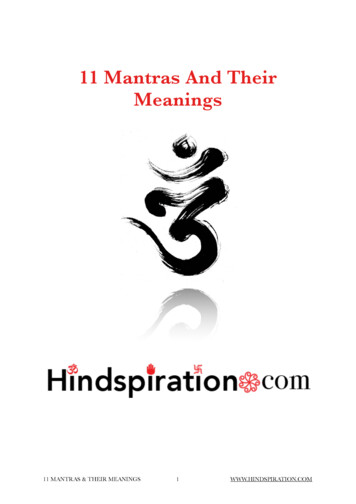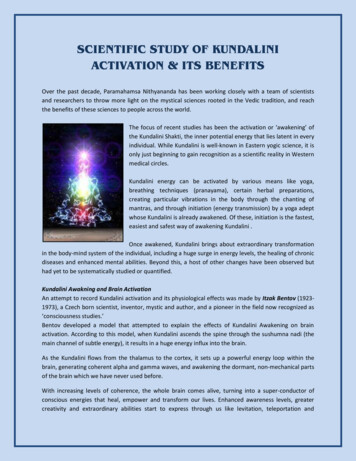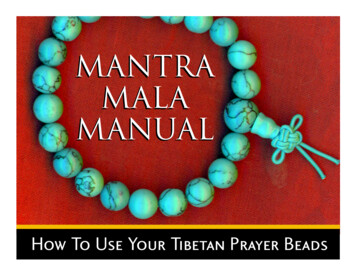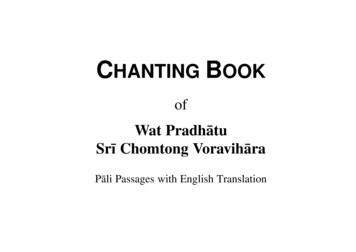
Transcription
CHANTING BOOKofWat PradhātuSrī Chomtong VoravihāraPāli Passages with English Translation
Chanting Book of Wat Phra Dhātu Srī Chomtong VoravihāraChanting Book of Wat Phra Dhātu Srī Chomtong VoravihāraPāli Passages with English TranslationCompiled, partly translated & editedbyPhra Claus Pabhaïkaro (Dr. Claus Sandler)Chomtong (Thailand),1st edition, September 20032nd edition (Version 2.0), corrected & slightly expanded, October 20031Version 2.1: Götzenhain (Germany), December 2003Version 2.2 (slightly improved): Götzenhain (Germany), February 20041Thanks for the donations from Jonathan Preboy (100 Baht), Maggy (400 Baht), and Pra Noah Yuttadhammo (80 Baht).2
Table of ContentsThe page numbers of the Thai Edition are given in brackets.PREFACE9CHANTING11[1] Paying Respect To Buddha's Relic At Wat Phra Dhātu Srī Chomtong Voravihāra11[1] Paying Respect To Luang-Pho Phet Buddha Image11Morning Chanting12[2] Paying Respect To The Triple Gem[2] Pubbabhāga-Namakāra-Pāñha12Preliminary Passage In Homage (To The Buddha)13[3] Buddhābhithutiü Praise For Buddha13[3] Dhammābhithutiü Praise For Buddha's Teaching14[3] Saïghābhithutiü Praise For The Saïgha14[4] Salutation to the Triple Gem & Passage Expressing A Sense Of Urgency15[4] Ratanattayappaõāma-gāthā Salutation To The Triple Gem15[5] Saüvega-parikittana-pāñha Passage Expressing A Sense Of Urgency16[6] Taï-khaõika-paccavekkhaõa-vidhī Reflection at the Moment (of Using the Requisites)18[6] Dhātu-pañikūla-paccavekkhaõa-vidhī Reflection On The Elements And Loathsomeness19[7] Devatā-pattidāna-gāthā Offering Merit To The Devas20[8] KAAM GRUAT NAAM BÄP PÜN MÜANG Offering Merit (Northern Thai Style)21[9] Offering Merit By SOMDET PHRAPHUT AJAAN (AAJ AASABHA Mahāthera)22[9] WAN DAA LUANG Asking For Forgiveness From The Triple Gems And All Devas23[10] WAN DAA NOI Asking For Forgiveness From The Abbot243
Chanting Book of Wat Phra Dhātu Srī Chomtong VoravihāraEvening Chanting24[10] Paying Respect To The Triple Gem24[11] Pubbabhāga-Namakāra-Pāñha Preliminary Passage In Homage (to the Buddha)25[11] Buddhānussati A Guide To The Recollection Of The Buddha25[11] Buddhābhigītiü Verses In Celebration Of The Buddha26[12] Dhammānussati A Guide To The Recollection Of The Dhamma27[12] Dhammābhigītiü Verses In Celebration Of The Dhamma27[13] Saïghānussati A Guide To The Recollection Of The Saïgha28[13] Saïghābhigītiü Verses In Celebration Of The Saïgha29[14] Atīta-paccavekkhaõa-vidhī Reflection After Using (The Requisites)30[15] Uddisanādhiññhāna-gāthā Offering Merit31[16] Buddha-maïgala-gāthā The Auspicious Awakened Ones32[16] Dasa-Dhamma-Sutta Ten (Recommended) Conducts (For Monks)34Special Chanting for Nuns & Laypeople at the Evening before the ’Buddhist Holy Day’ (WAN GOON)35[20] Ratana-ttaya-kāra-pāñha (Brief) Salutation Of The Triple Gem35[20] Pubbabhāga-Namakāra-Pāñha Preliminary Passage in Homage (to the Buddha)35[18] Ārādhanā-tisaraõa-aññha-sīla Requesting the Three Refuges and the Eight Precepts36[18] Pubbabhāga-Namakāra-Pāñha Preliminary Passage in Homage (to the Buddha)36[18] Saraõa-Gamana-Pāñha Going to the Three Refuges36[19] Aññha-Sīla Eight Precepts37[19] Ārādhanā-dhamma-desanā Invitation To Teach Dhamma38[ ] Asking Forgiveness To The Triple Gem39Formal Requests[18] Ārādhanā-sīla Requesting The (Five) Precepts44141
[19] Ārādhanā-uposatha-sīlaRequesting The Precepts On Uposatha Days43[21] Ārādhanā Paritta Requesting Blessings43[21] Invitation To The Devas 144[22] Invitation To The Devas 2 (Samantā Cakkavāëesu . From All Round The World-Systems)44Parittas Protective Blessings46[23] Namakāra-siddhi-gāthā The Verses On Success Through Homage46[24] Sambuddhe The Buddhas47[24] Namo-kāra-aññhaka The Homage Octet47[25] Maïgala-sutta The Discourse on Good Fortune48[26] BODKHAT-ratana-sutta49[27] Cha-ratana-paritta-gāthā The Six Protective Verses from the Discourse on Treasures50[29] Karaõīya-metta-sutta The Discourse on Lovingkindness52[30] Khandha-paritta-gāthā The Group Protection54[30] Vaññaka-paritta The Baby Quail’s Protection55[31] Mora-paritta The Peacock’s Protection55[32] Āñānāñiya-paritta Homage to the Seven Past Buddhas56[32] Aïgulimāla-paritta (Venerable) Aïgulimāla’s Protection57[33] Bojjhaïga-paritta The Factor-of-Awakening Protection57[34] Abhaya-paritta The Danger-free Protection58[34] "Sakkatvā buddha-ratanaü ." "Having revered the jewel of the Buddha ."59[35] Maha-maïgala-cakkavāëa The Great Sphere Of Blessings60[36] "Nakkhattayakkha ." Power Of Protection62[36] Dhajagga-paritta The Top-of-the-Banner-Staff Protection62[37] Buddha-jaya-maïgala-gāthā The Verses Of The Buddha's Auspicious Victories635
Chanting Book of Wat Phra Dhātu Srī Chomtong Voravihāra[38] Jaya-paritta The Victory Protection64[39] Sumaïgala-gāthā Verses Of Excellent Blessing65Discourses66[39] Dhajagga-sutta The Discourse on the Crest of Banners66[42] Dhamma-cakka-ppavattana-sutta69The Discourse on Setting the Wheel of Dhamma in Motion[47] Anatta-lakkhaõa-sutta The Discourse on the Not-self Characteristic76[50] Dhamma-niyāma-sutta The Discourse on the Orderliness of the Dhamma81Gāthās etc. Verses (& Dependent Origination)83[51] Uõhassa vijaya-gāthā Verses On The Victory Over Heat83[51] "Bhesajjaü" . "Medicine" .83[52] Pabbatopama-gāthā The Mountain84[53] Ariya-dhana-gāthā Noble Wealth85[53] Tilakkhaõādi-gāthā Compounded Things85[54] Pañicca-samuppāda-pāñha Dependent Origination86[54] Buddha-udāna-gāthā The Buddha Inspired Verses87[55] Bhaddekaratta-gāthā An Auspicious Day88Abhidhamma89[55] Dhammasaïgiõī-mātikā Matrix of the Dhammasaïgaõī89[57] Mahāpaññhāna-mātika-pāñha Passage On The Matrix Of The Paññhāna91[57] Dhammasaïgiõī Enumeration Of Phenomena91[57] Vibhaïga Classification (of Phenomena)92[58] Dhātukathā Discussion of Elements92[58] Puggala-pañati Description Of Persons93[58] Kathāvatthu Points Of Controversy936
[59] Yamaka (The Book Of) Pairs94[59] Paññhāna (Matrix Of The Book On) Origination94Miscellaneous Verses I95[59] Dukkha-ppattādi-gāthā or Devatā-uyyojana-gāthā Verses on 'Having Got Suffering and so on'95[60] Paüsukūlatāya (Compounded Things)96[60] Paüsukūla-gāthā Verses (for Recitation while taking) Paüsukūla (Robes)96[60] Tiro-kuóóa-kaõóha-pacchima-bhāga (Adāsi-me-ādi-gāthā Verses on ’He Gave to Me’, etc.)96[60] Aññhavīsati-buddha-paritta ("Namo me" .) The Protective Blessing Of The 28 Buddhas97Anumodanā Thanksgiving & Transfering of Merit98[62] Anumodanā-vidhī ("Yathā vārivahā pūrā .") Means Of Blessing98[62] Culla-maïgala-cakka-vāla The Lesser Sphere Of Blessings98[63] Ratana-ttayānubhavādi-gāthā Verses on the Power of the Triple Gem99[63] Keõiyānumodana-gāthā Verses Of Benediction In The Keõīyāsutta100[64] Kāla-dāna-sutta-gāthā Verses Of Benediction On Timely Offering100[64] Aggappasāda-sutta-gāthā The Verses from the Discourse on the Supreme (Objects of) Faith101[64] Bhojana-dānānumodana-gāthā Verses (of the Discourse) on Rejoicing in the Gift of Food101[65] Devatādissa-dakkhiõānumodana-gāthā Verses for Sharing of Merit with Devas102[65] Ādiya-sutta-gāthā Discourse on Edibles102[65] Vihāradāna-gāthā Verses on the Gift of a Dwelling-place103Miscellaneous Verses II104[66] Khemākhema-saraõa-gamana-paridīpikā-gāthā Secure & Unsecure Refuge104[66] “Sukho” . ”Happy” .105[67] "Buddho maïgala-sambhūto" . "The Buddha has arisen due to good fortune" .106[67] Jaya-pañjara-paõõarasa-gāthā The Victor's Cage1067
Chanting Book of Wat Phra Dhātu Srī Chomtong Voravihāra[ ] PāramīThe (Ten) Perfections (Of The Buddha)Paying Respect To The Buddha With A Flower Bouquet, Incents & Candles On Buddhist Holy Days (WAN PHRA)[76] Paying Respect To The Buddha With OfferingsSpecial Chants for Monks108108115115[87] Before Reciting the Pāñimokkha115[ ] After Reciting the Pāñimokkha116[90] Vassāvāsa Rains-Residence118[90] Khamāpana-kamma Asking for Forgiveness119[92] KHAAM-LAA-Sikkhā Disrobing119APPENDIX120Pronunciation Rules For Pāli & Thai120Major Thai Buddhist Festivals122The Various Uses of Paritta123Index To The Beginning Of The Pali Chants124Abbreviations & Literature1268
PrefaceOn the auspicious occasion of the eightieth birthday of our great teacher PHRA RAACHA PHROM AJAAN THONG (Sirimaïgalo) I express my joyby publishing this Chanting Book, which contains most of the texts chanted at Wat Phra Dhātu Srī Chomtong Voravihāra with Englishtranslation.This book is mainly a compilation of different sources (see ’Abbreviations & Literature’), which I occasionally tried to improve a bit. When Iwas not able to find an English translation for the Pāli, I attempted to produce one myself to get an idea of the content. Though I tried my best,some of them might need some corrections and improvements in the future.The reader won’t find many explanations of names and technical terms. For this purpose I suggest to make use of the Dictionary of Pali ProperNames (BPPN) and the Buddhist Dictionary (BudDic).Thanks to Phra Noah (Yuttadhammo) who initiated this Chanting Book, collected many of the internet resources and allowed me to regularlyuse the computer in his Kuti. He also translated the Thai-Version of the ’Invitation To Teach Dhamma’ and together with Phra Dhammapālo(Norawee) thanks also to him the Thai passages of the ’Paying Respect To The Buddha With A Flower Bouquet.’ [76]. Furthermore hecorrected some of my English. Thank you also to Mr. Prajuab Lakruji (formally Phra Prajuab) who transcribed and translated the Thai passagesof ’Offering Merit’ [9] into English.Contrary to Pāli there exists no international standard for transcribing Thai with Roman letters. So Mr. Prajuab Lakruji and Phra Noah usedsomewhat different transcriptions, which I again changed a bit for the purpose of homogenization and economization. Now the Thaitranscription makes use of the pronunciation rules for the Pāli. Thereby three new letters for vowels are added (see ’Appendix, PronunciationRules For Pāli & Thai’). To distinguish Thai passages from Pāli, Thai words are written with CAPITALS.As everything in this world this book isn’t perfect. So I apologize for any shortcomings and would welcome criticism & corrections for futureimprovements.May all beings be happy and peaceful!Phra Claus (Pabhaïkaro, Dr. Claus Sandler)Chomtong (Thailand), September 2003(e-mail: dhammaclaus@freenet.de)9
Chanting Book of Wat Phra Dhātu Srī Chomtong Voravihāra10
T[1]TChanting[1] Paying Respect To Buddha's Relic At Wat Phra Dhātu Srī Chomtong VoravihāraNamo buddhāya;Namāmi tiloka-molīloha-kūñe patiññhitaüPūjitaü sabbalokehikittimantaü manoharaüAhaü vandāmi sabbadāAïgavahaye pure ramme 1kovilāragga-pabbateSahi-hema-gūhā2 gabbhe dakkhiõa-molī-dhātuyo;Ahaü vandāmi sabbadā.Homage to the Buddha.I pay homage to (the Dakkhiõamolī3 relic, a piece of bone of the right side of)the crown of (his) head (revered) in the three worlds, placed in a metallicspire, honored, & renowned by all peoples, & charming.I (will) always revere it.Near the beautiful town Aïgavahaya, on the mountaintop, where the treeBauhinia variegate (grows)4, is enshrined within a golden cavern theDakkhiõamolī relic.I (will) always revere it.[1] Paying Respect To Luang-Pho Phet Buddha ImageKāyena vācāya va cetassa vāvajiraü nāma pañimaü iddhi-pāñihāriyakaraübuddha-rūpaü ahaü vandāmi sabbaso;sadā sotthī bhavantu me.12345By body, by speech, & by mindI (will) always revere the image named diamond5,the Buddha statue, working wonders of psychic power.May I be blessed forevermore.koviëāra Bauhinia variegata; a tree in the devaloka . (PED)guhā f a hiding place, a cave, cavern . (PED)dakkhiõa Adj right; moli m n crest, crown of the head (cf. cPED, PED)In the ’Chronicle’ (p. 54) the part »on the mountaintop, where the tree Bauhinia variegate (grows)« is translated as »on the summit of Doi [ mountain] Chomtong«.»In naming this Lord Buddha image after the most valuable of precious stones, the Thai people express the faithful veneration and high respect they hold for the image thecall "Luang Poh Petch."« (Chronicle, p. 239)11
Chanting Book of Wat Phra Dhātu Srī Chomtong VoravihāraT[2]TMorning Chanting[2] Paying Respect To The Triple GemYo so bhagavā arahaü sammā-sambuddhosvākkhāto yena bhagavatā dhammosupañipanno yassa bhagavato sāvaka-saïgho.tam ayaü bhagavantaü sa-dhammaü sa-saïghaüimehi sakkārehi yathārahaü āropitehi abhipūjayāma.sādhu no bhante bhagavā sucira-parinibbuto pi, pacchimājanatānukampa-mānasā, ime sakkāre duggata-paõõākārabhūte pañigaõhātu,amhākaü dīgha-rattaü hitāya sukhāya.He truly is the Blessed One, The Accomplished One, the Perfectly Enlightened(Buddha).Well-Proclaimed is the Holy Teaching of the Blessed One.Perfectly Practiced are the Holy Disciples of the Blessed One.To the Blessed One, to the Dhamma and to the Saïgha,with these properly presented offerings, we pay homage.May the Blessed One, even through he has long since entered Total Nibbāna,please accept these meager offerings with a heart of sympathy for latergenerations,for our long-term welfare & happiness.Arahaü sammā-sambuddho bhagavā;buddhaü bhagavantaü abhivādemi.Blessed is He, the Accomplished One, the Perfectly Enlightened One.To the Buddha, the Blessed One, I pay homage.(PROSTRATE 1 TIME)Svākkhāto bhagavatā dhammo;dhammaü namassāmi.Well-Proclaimed is the Teaching of the Blessed One.To the Dhamma I pay Homage.(PROSTRATE 1 TIME)Supañipanno bhagavato sāvaka-saïgho;saïghaü namāmi.(PROSTRATE 1 TIME)12Perfectly Practiced are the Disciples of the Blessed One.I bow low to the Saïgha.
Morning ChantingT[3]T[2] Pubbabhāga-Namakāra-Pāñha Preliminary Passage In Homage (To The Buddha)(LEADER:)Handa mayaü buddhassa bhagavato pubbabhāganamakāraü karomase.Now let us chant the preliminary (passage in) homage to the Blessed One.(ALL:)Namo tassa bhagavato arahato sammā- sambuddhassa;namo tassa bhagavato arahato sammā- sambuddhassa;namo tassa bhagavato arahato sammā- sambuddhassa.Homage to the Blessed One, the Worthy One, the Perfectly Self-awakened One.Homage to the Blessed One, the Worthy One, the Perfectly Self-awakened One.Homage to the Blessed One, the Worthy One, the Perfectly Self-awakened One.[3] Buddhābhithutiü Praise For Buddha(LEADER:)Handa mayaü buddhābhithutiü karomase.Now let us give high praise to the Awakened One:(ALL:)[Yo so tathāgato] arahaü sammā-sambuddho,vijjā-caraõa-sampanno sugato lokavidū,anuttaro purisa-damma-sārathi satthā deva-manussānaübuddho bhagavā;yo imaü lokaü sa-devakaü sa-mārakaü sa-brahmakaü,sa-ssamaõa-brāhmaõiü pajaü sadeva-manussaü sayaüabhiññā sacchikatvā pavedesiyo dhammaü desesi ādi-kalyāõaü majjhe-kalyāõaüpariyosāna-kalyāõaüsātthaü sa-byañjanaü kevala-paripuõõaü parisuddhaübrahma-cariyaü pakāsesi:tam ahaü bhagavantaü abhipūjayāmi,tam ahaü bhagavantaü sirasā namāmi.(PROSTRATE 1 TIME)13He who has attained the truth, the Worthy One, Perfectly Self-awakened,consummate in knowledge & conduct, one who has gone the good way,knower of the cosmos,unexcelled trainer of those who can be taught, teacher of human & divinebeings; awakened; blessed;who made known having realized it through direct knowledge this worldwith its devas, māras, & brahmas, its generations with their contemplatives &priests, their rulers & common people;who explained the Dhamma fine in the beginning, fine in the middle, fine inthe end;who expounded the holy life both in its particulars & in its essence, entirelycomplete, surpassingly pure:I worship most highly that Blessed One,To that Blessed One I bow my head down.
Chanting Book of Wat Phra Dhātu Srī Chomtong VoravihāraT[3]T[3] Dhammābhithutiü Praise For Buddha's Teaching(LEADER:)Handa mayaü dhammābhithutiü karomase.Now let us give high praise to the Dhamma:(ALL:)[Yo so svākkhāto] bhagavatā dhammo,sandiññhiko akāliko ehipassiko,opanayiko paccattaü veditabbo viññūhi,tam ahaü dhammaü abhipūjayāmi,tam ahaü dhammaü sirasā namāmi.The Dhamma well-expounded by the Blessed One,to be seen here & now, timeless, inviting all to come & see,leading inward, to be seen by the wise for themselves:I worship most highly that Dhamma,To that Dhamma I bow my head down.(PROSTRATE 1 TIME)[3] Saïghābhithutiü Praise For The Saïgha(LEADER:)Handa mayaü saïghābhithutiü karomase.Now let us give high praise to the Saïgha:(ALL:)[Yo so supañipanno] bhagavato sāvaka-saïgho,uju-pañipanno bhagavato sāvaka-saïgho,ñāya-pañipanno bhagavato sāvaka-saïgho,sāmīci-pañipanno bhagavato sāvaka-saïgho,yad idaü cattāri purisa-yugāni aññha purisa-puggalā;esa bhagavato sāvaka-saïgho āhuneyyo pāhuneyyodakkhiõeyyo añjali-karaõīyo,anuttaraü puññakkhettaü lokassa;tam ahaü saïghaü abhipūjayāmi,tam ahaü [4] saïghaü sirasā namāmi.14The Saïgha of the Blessed One’s disciples who have practiced well,the Saïgha of the Blessed One’s disciples who have practicedstraightforwardly,the Saïgha of the Blessed One’s disciples who have practiced methodically,the Saïgha of the Blessed One’s disciples who have practiced masterfully,i.e., the four pairs the eight types of Noble Ones:That is the Saïgha of the Blessed One’s disciples worthy of gifts, worthy ofhospitality, worthy of offerings, worthy of respect,the incomparable field of merit for the world:I worship most highly that Saïgha,To that Saïgha I bow my head down.
Morning ChantingT[4]T(PROSTRATE 1 TIME)[4] Salutation to the Triple Gem & Passage Expressing A Sense Of Urgency(LEADER:)Handa mayaü ratana-ttaya-ppaõāma-gāthāyo c’ evasaüvega-vatthu-paridīpaka-pāñhañ ca bhaõāmase.Now let us recite the stanzas in salutation to the Triple Gem togetherwith the passage on the topics inspiring a sense of chasteneddispassion:[4] Ratanattayappaõāma-gāthā Salutation To The Triple Gem(ALL:)Buddho susuddho karuõā-mahaõõavo,Yo ’ccanta-suddhabbara-ñāõa-locano,Lokassa pāpūpakilesa-ghātako:Vandāmi buddhaü aham ādarena taü.The Buddha, well-purified, with ocean-like compassion,Possessed of the eye of knowledge completely purified,Destroyer of the evils & corruptions of the world:I revere that Buddha with devotion.Dhammo padīpo viya tassa satthuno,Yo magga-pākāmata-bhedabhinnako,Lokuttaro yo ca tad-attha-dīpano:Vandāmi dhammaü aham ādarena taü.The Teacher’s Dhamma, like a lamp,divided into Path, Fruition, & the Deathless,both transcendent (itself) & showing the way to that goal:I revere that Dhamma with devotion.Saïgho sukhettābhyatikhetta-saññito,Yo diññha-santo sugatānubodhako,Lolappahīno ariyo sumedhaso:Vandāmi saïghaü aham ādarena taü.The Saïgha, called a field better than the best,who have seen peace, awakening after the one gone the good way,who have abandoned carelessness the noble ones, the wise:I revere that Saïgha with devotion.Icc evam ekant’abhipūjaneyyakaü,Vatthuttayaü vandayatābhisaïkhataü,Puññaü mayā yaü mama sabbupaddavā,Mā hontu ve tassa pabhāva-siddhiyā.By the power of the merit I have madein giving reverence to the Triple Gemworthy of only the highest homage,may all my obstructions cease to be.15
T[5]TChanting Book of Wat Phra Dhātu Srī Chomtong Voravihāra[5] Saüvega-parikittana-pāñha Passage Expressing A Sense Of UrgencyIdha tathāgato loke uppanno arahaü sammā-sambuddho,Dhammo ca desito niyyāniko upasamiko parinibbānikosambodhagāmī sugata-ppavedito.Mayan taü dhammaü sutvā evaü jānāma:Jāti pi dukkhā jarā pi dukkhā maraõam pi dukkhaü,soka-parideva-dukkha-domanassupāyāsā pi dukkhā,Appiyehi sampayogo dukkho piyehi vippayogo dukkhoyam p’ icchaü na labhati tam pi dukkhaü.Saïkhittena pañc-upādāna-kkhandhā andho.Yesaü pariññāya, dharamāno so bhagavā, evaü bahulaüsāvake vineti; evaü bhāgā ca pan’ assa bhagavatosāvakesu anusāsanī, bahulaü pavattati:"Rūpaü aniccaü,vedanā aniccā,saññā aniccā,saïkhārā aniccā,viññāõaü aniccaü,rūpaü anattā,vedanā anattā,saññā anattā,saïkhārā anattā,16Here, One attained to the Truth, Worthy & Perfectly Self-awakened, hasappeared in the world,And Dhamma is explained, leading out (of Saüsāra), calming, tending towardtotal Nibbāna, going to self-awakening, declared by one who has gone thegood way.Having heard the Dhamma, we know this:Birth is stressful, aging is stressful, death is stressful,Sorrow, lamentation, pain, distress, & despair are stressful,Association with things disliked is stressful, separation from things liked isstressful, not getting what one wants is stressful.In short, the five clinging-aggregates are stressful,Namely:Form as a clinging-aggregate,feeling as a clinging-aggregate,perception as a clinging-aggregate,mental processes as a clinging-aggregate,consciousness as a clinging-aggregate.So that they might fully understand this, the Blessed One, while still alive,often instructed his listeners in this way; many times did he emphasize thispart of his admonition:"Form is inconstant,feeling is inconstant,perception is inconstant,mental processes are inconstant,consciousness is inconstant,form is not-self,feeling is not-self,perception is not-self,mental processes are not-self,
Morning Chantingviññāõaü anattā,sabbe saïkhārā aniccā,sabbe dhammā anattā ti."Te1 mayaü, otiõõāmha jātiyā jarā-maraõena, sokehiparidevehi dukkhehi domanassehi upāyāsehi, dukkh’otiõõā dukkha-paretā,"App eva nām’ imassa kevalassa dukkha-kkhandhassaantakiriyā paññāyethāti!"[6]Tconsciousness is not-self;all processes are inconstant,all phenomena are not-self."All of us, beset by birth, aging, & death, by sorrows, lamentations, pains,distresses, & despairs, beset by stress, overcome with stress, (consider),"O, that the end of this entire mass of suffering & stress might be known!"(ONLY MONKS & NOVICES:)Cira-parinibbutam pi taü bhagavantaü uddissa arahantaüsammā-sambuddhaü, saddhā agārasmā anagāriyaüpabbajitā.Tasmiü bhagavati brahmacariyaü carāma(bhikkhūnaü sikkhā-sājīva-samāpannā).2Taü no brahmacariyaü imassa kevalassa dukkhakkhandhassa antakiriyāya saüvattatū ti.Though the total Liberation of the Blessed One, the Worthy One, the PerfectlySelf-awakened One, was long ago, we have gone forth in faith from home tohomelessness in dedication to him.We practice that Blessed One’s holy life(fully endowed with the Bhikkhus’ training & livelihood).May this holy life of ours bring about the end of this entire mass of suffering& stress.(OTHERS:)Cira-parinibbutam pi taü bhagavantaü saraõaü gatā,dhammañ ca bhikkhu-saïghañ ca,Tassa bhagavato sāsanaü [6] yathā-sati yathā-balaümanasikaroma, anupañipajjāma,sā sā no pañipatti, imassa kevalassa dukkha-kkhandhassaantakiriyāya saüvattatū ti.12WOMEN: TāNOVICES omitt this line.17Though the total Liberation of the Blessed One, the Worthy One, the PerfectlySelf-awakened One, was long ago, we have gone for refuge in him, in theDhamma, & in the Bhikkhu Saïgha,We attend to the instruction of the Blessed One, as far as our mindfulness &strength will allow, and we practice accordingly.May this practice of ours bring about the end of this entire mass of suffering& stress.
T[6]TChanting Book of Wat Phra Dhātu Srī Chomtong Voravihāra[6] Taï-khaõika-paccavekkhaõa-vidhī Reflection at the Moment (of Using the Requisites)(LEADER:)Handa mayaü ow let us recite the passage for reflection at the moment (of using therequisites):(ALL:)Pañisaïkhā yoniso cīvaraü pañisevāmi,yāvad eva sītassa pañighātāya,uõhassa a-samphassānaüpañighātāya, yāvad eva hiri-kopina-pañicchādan’- atthaü.Considering it thoughtfully, I use the robe,simply to counteract the cold,to counteract the heat,to counteract the touch of flies, mosquitoes, wind, sun, & reptiles;Simply for the purpose of covering the parts of the body that cause shame.Pañisaïkhā yoniso piõóapātaü pañisevāmi,neva davāya na madāya na maõóanāya na vibhūsanāya,Considering it thoughtfully, I use alms food,not playfully, nor for intoxication, nor for putting on bulk, nor forbeautification,but simply for the survival & continuance of this body, for ending itsafflictions, for the support of the holy life,(thinking,) thus will I destroy old feelings (of hunger) and not create newfeelings (from overeating).I will maintain myself, be blameless, & live in comfort.yāvad eva imassa kāyassa ñhitiyā yāpanāyavihiüsuparatiyā brahmacariyānuggahāya,iti purāõañ ca vedanaü pañihaïkhāmi, navañ ca vedanaüna uppādessāmi;yātrā ca me bhavissati anavajjatā ca phāsuvihāro cā ti.Pañisaïkhā yoniso senāsanaü pañisevāmi,yāvad eva sītassa pañighātāya,uõhassa a-samphassānaüpañighātāya,yāvad eva utu-parissaya-vinodanaü pañisallānārām’atthaü.Pañisaïkhā yoniso ,18Considering it thoughtfully, I use the lodging,simply to counteract the cold,to counteract the heat,to counteract the touch of flies, mosquitoes, wind, sun, & reptiles;simply for protection from the inclemencies of weather and for the enjoymentof seclusion.Considering them thoughtfully, I use medicinal requisites for curing the sick,
Morning Chantingyāvad eva uppannānaü veyyābādhikānaü vedanānaüpañighātāya,abyāpajjha-paramatāyā ti.[7]Tsimply to counteract any pains of illness that have arisen,and for maximum freedom from disease.[6] Dhātu-pañikūla-paccavekkhaõa-vidhī Reflection On The Elements And Loathsomeness1(LEADER:)Handha mayaü seNow let us recite the passage for reflection on the elements and loathsomeness(of using the requisites):(ALL:)Yathā-paccayaü pavattamānaü dhātu-mattam ev' etaüyad idaü cīvaraü, tad upabhuñjako ca puggalodhātumattako nissatto nijjīvo suñño; sabbāni [7] panaimāni cīvarāni ajigucchanīyāni imaü pūti-kāyaü patvāativiya jigucchanīyāni jāyanti.Dependent upon and existing through its causes merely by the combination ofvarious elements are both this robe and the person who uses it; only elements,not a being, not possessing a permanent life principle, being void of self orsoul. All these robes are not yet loathsome but having touched this putridbody, become exceedingly loathsome.Yathā-paccayaü pavattamānaü dhātu-mattam ev' etaüyad idaü piõóapāto, tad upabhuñjako ca puggalodhātumattako nissatto nijjīvo suñño; sabbo pan’ āyaüpiõóapāto ajigucchanīyo imaü pūti-kāyaü patvā ativiyajigucchanīyo jāyati.Dependent upon and existing through its causes merely by the combination ofvarious elements are both this alms food and the person who uses it; onlyelements, not a being, not possessing a permanent life principle, being void ofself or soul. All this alms food is not yet loathsome but having touched thisputrid body, becomes exceedingly loathsome.Yathā-paccayaü pavattamānaü dhātu-mattam ev' etaüyad idaü senāsanaü, tad upabhuñjako ca puggalodhātumattako nissatto nijjīvo suñño; sabbāni pana imānisenāsanāni ajigucchanīyāni imaü pūti-kāyaü patvāativiya jigucchanīyāni jāyanti.Dependent upon and existing through its causes merely by the combination ofvarious elements are both this lodging and the person who uses it; onlyelements, not a being, not possessing a permanent life principle, being void ofself or soul. All this lodgings are not yet loathsome but having touched thisputrid body, become exceedingly loathsome.Yathā-paccayaü pavattamānaü dhātu-mattam ev' etaüDependent upon and existing through its causes merely by the combination of1Pūjā p. 34 ff.19
Chanting Book of Wat Phra Dhātu Srī Chomtong VoravihāraT[7]Tyad idaü gilāna-paccaya-bhesajja-parikkhāro, tadupabhuñjako ca puggalo dhātumattako nissatto nijjīvosuñño; sabbo panāyaü imaüpūti-kāyaüpatvāativiyajigucchanīyo jāyati.various elements are both this medicinal requisites for curing the sick and theperson who uses it; only elements, not a being, not possessing a permanentlife principle, being void of self or soul. All these medicinal requisites forcuring the sick are not yet loathsome but having touched this putrid body,become exceedingly loathsome.[7] Devatā-pattidāna-gāthā Offering Merit To The Devas(LEADER:)Handa mayaü pattidāna-gāthāyo bhanāmase:Let us recite the verse for dedicating merit:(ALL:)Ya devatā santi vihāra-vāsinīthūpe ghare bodhi-ghare tahiü tahiütā dhamma-dānena bhavantu pūjitāsotthiü karontedha vihāra-maõóale.therā ca majjhā navakā ca bhikkhavosārāmikā dānapatī upāsakāgāmā ca desa nigamā ca issarāsappāõa-bhūtā sukhitā bhavantu te.Elder, intermediate, and new monks,temple attendants, donors, lay followers;towns, cities, and principalities:may all sentient beings be happy.Jalābu-jā ye pi ca aõóa-sambhavā[8] saüseda-jātā atha v' opapātikāniyyānikaü dhamma-varaü pañicca tesabbe pi dhukkhassa karontu saïkhayaü.Whether born from a womb, from an egg,from slime, or spontaneously arising:may they all, in dependence on the foremost Dhamma for leading out, makean end to suffering and stress.µhātu ciraü sataü dhammodhamma-ddharā capuggalāsaïgho hotu samaggo vaatthāya ca hitāya caamhe rakkhatu saddhammosabbe pi dhammacārino20May the devas dwelling in the temple,here and there in the stupa, the buildings, the Bodhi tree enclosure,be honored with the gift of Dhamma.May they bring about well-being here in the monastery.May the Dhamma stand firm for long,May the Saïgha live in harmony,May the true Dhamma protect us,along with those individualswho maintain it.for our welfare and benefit.together with all who practicethe Dhamma.
Morning Chantingvuóóhiü sampāpuõeyyāmadhamme ariyappavedite.Pasannā hontu sabbe pipāõino buddha-sāsanesammā dhāraü pavecchanto kāle devo pavassatuvuóóhi-bhāvāya sattānaüsamiddhaü netumedhaniümātā pitā ca atrajaüniccaü rakkhanti puttakaüevaü dhammena rājāno pajaü rakkhantu sabbadā.May we flourish in the DhammaMay all beings have faithMay rain fall in season,May it lead the prosperous earthT[8]Ttaught by the Noble Ones.in the Buddha's teaching.in moderate streams.to the flourishing of living beings.Just as mother and father alwaysprotect their own children,In the same way may the government always protect its citizens withrighteousness.Usually the Morning Chanting continues now on page 46 with the [22] Pubbabhāga-Namakāra-Pāñha The Preliminary Passagge In
Chanting Book of Wat Phra Dhātu Srī Chomtong Voravihāra Evening Chanting 24 [10] Paying Respect To The Triple Gem 24 [11] Pubbabhāga-Namakāra-Pāñha Preliminary Passage In Homage (to the Buddha) 25 [11] Buddhānussati A Guide To The Recollection Of The Buddha 25 [11] Buddhābhigītiü Verses In Celebration Of The
